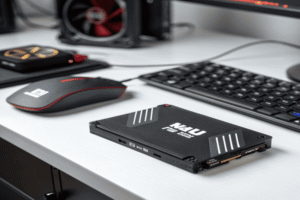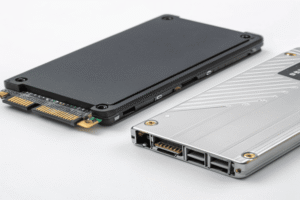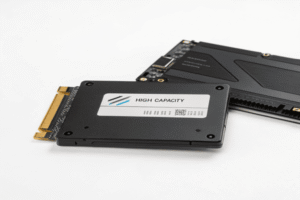Fast load times, reliability, and storage for your game library: these are the real upgrades you get with a good gaming SSD. Without one, you keep waiting and miss out on a seamless experience.
The best SSD for gaming in 2025 is typically aThe best SSD for gaming in 2025 is typically a Gen 4 M.2 NVMe model like the WD Black SN7100 or Samsung 990 Pro[^1]
[^1]: Discover the features of the Samsung 990 Pro that make it a leading option for gamers seeking speed and reliability.
NVMe model like the WD Black SN7100 or Samsung 990 Pro. Both offer blazing speeds, high durability, and enough storage for big game installs and system files, making them ideal for demanding PC gaming setups.[1][3][5]

Jumping on the SSD bandwagon isn’t about chasing numbers. It’s about making sure your hardware actually gives you smooth gameplay, quick boots, and lets you keep all your favorite games installed. Now, let’s break down the details you really need to know before you buy.
Which type of SSD is better for gaming?
It’s easy to fall for the hype around It’s easy to fall for the hype around PCIe 5.0 SSDs[^1]
[^1]: Explore expert opinions and analyses to determine if the excitement surrounding PCIe 5.0 SSDs is warranted.
. They are much faster on paper, but the real-world gains for gaming aren’t always dramatic.[1][3][5][2]
For gaming, a PCIe 4.0 M.2 NVMe SSD is best: it hits a sweet spot in cost, speed, and compatibility. Today’s Gen 4 drives like WD Black SN7100 and Samsung 990 Pro are fast enough that you’ll see huge benefits in load times, and you rarely need more from a PCIe 5.0 drive.[1][3][5]

SSD Interface Comparison
| SSD Type | Max Read Speed | Typical Use for Gaming | Price/GB | Pros | Cons |
|---|---|---|---|---|---|
| SATA SSD | ~550 MB/s | Backup drives, budget systems | $ | Cheap, easy upgrade | Much slower load times |
| PCIe 3.0 NVMe SSD | ~3,500 MB/s | Entry/mid-level gaming rigs | $$ | Good performance, widely compatible | Not top speeds |
| PCIe 4.0 NVMe SSD | ~7,400 MB/s | Recommended for most gamers | $$-$$$ | Very fast, affordable, wide support | Real speed capped by games |
| PCIe 5.0 NVMe SSD | ~15,000 MB/s | Enthusiast, pro workstations | $$$$ | Crazy sequential speeds, newest tech | Expensive, runs hot |
Most games rely on random read/write speeds rather than raw sequential throughput. Modern Gen 4 NVMe drives, tested and proven in benchmarks, usually load games just as quickly as PCIe 5.0 SSDs once inside the game. Gen 5 is great if you want bragging rights or future-proofing, but for the vast majority of gaming builds, it’s overkill.[3][5]
Is a 512 SSD better than a 1TB SSD for gaming?
AA 1TB SSD is better than a 512GB SSD[^1] for gaming because today’s games are huge, often topping 100GB each
[^1]: Check this resource to see if a 512GB SSD can meet your gaming needs, especially with the increasing size of modern games.
is better than a 512GB SSD for gaming because today’s games are huge, often topping 100GB each. You don’t want to run out of space, be forced to uninstall old favorites, or see performance issues if your drive is nearly full.[1][3][5][6][8]

Storage Capacity Considerations
| SSD Size | How Many Games (AAA titles) | OS + Updates | Room for Media | Recommended For |
|---|---|---|---|---|
| 256GB | 1-2 | Windows + 1 | None | Only light use |
| 512GB | 3-5 | Windows + 2-3 | Very limited | Small game libraries |
| 1TB | 6-10+ | Windows + 5 | Some space | Main gaming setup |
| 2TB | 10-20+ | Windows + large library | Plenty | Power gamers, streaming |
| 4TB+ | 30+ | Everything | Lots | Pro creators, game hoarders |
Game sizes keep growing every year. Windows 11 itself can chew up 60GB or more, and a big release like Call of Duty or RDR2 can top 100GB. With just 512GB, you have to juggle installs, deal with updates, and may start to see your SSD slow down if nearly full.[1][3][6][8] That’s why, for any modern build, stick with at least 1TB—2TB is solid value if you can afford it.
What is the lifespan of a gaming SSD?
Modern SSDs last for years, often outlasting the PC itself. Most gaming SSDs come with a 5-year warranty andModern SSDs last for years, often outlasting the PC itself. Most gaming SSDs[^1] come with a 5-year warranty and endurance ratings of 1,200–2,400TB written (TBW)
[^1]: Explore this link to discover top-rated gaming SSDs that enhance your gaming experience with speed and reliability.
of 1,200–2,400TB written (TBW). If you mainly play games, you’ll likely never hit the write limits before upgrading your rig.[1][3][5][9][10][11][12]

SSD Lifespan and Reliability
| SSD Model | Typical Endurance (TBW) | Warranty | Real-life Lifespan | What Kills It | Notes |
|---|---|---|---|---|---|
| Mid-range (512GB-1TB) | 600–1,200TBW | 5 Years | 7–10 years | Power surges, heat | Gaming use very light write load |
| High-end (2TB+) | 1,200–2,400TBW | 5 Years | 10+ years | Controller failure | Data reads are not wear-intensive |
| HDD (mechanical drives) | N/A | 2-3 Years | 4–7 years | Mechanical wear | SSD outlasts HDD |
SSDs die very slowly. Error-correcting logic copes with data corruption, and most failures come from controller or firmware faults rather than worn-out cells. Even if you play hundreds of hours a month, most gaming loads are read-heavy, not write-heavy. So your SSD isn’t really getting worn down by gaming.[11][12] You might replace your SSD due to needing more space long before it wears out.
Conclusion
A good SSD for gaming means fast load times, enough space for big games, and years of reliable, hassle-free use. PCIe 4.0 NVMe drives in 1TB–2TB sizes are the safest, smartest bet.
